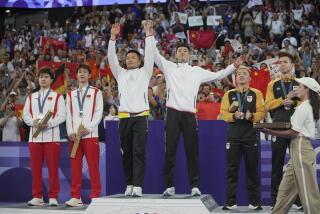Defiant Taiwan Puts Beijing in Difficult Straits
- Share via
BEIJING — Taiwanese President Lee Teng-hui’s solid victory in Saturday’s presidential election was a clear rejection of mainland China’s campaign of armed intimidation in the Taiwan Strait.
But even more of a blow to China’s military brinkmanship, which has included ballistic missile tests off Taiwan’s coast and live-fire exercises in the 100-mile-wide strait, was the poor showing of the candidates favored by Beijing.
In the next few days, the Communist leadership will face critical decisions on how to proceed in the face of the defiant stand by Taiwanese voters, who gave more than 75% of their votes to candidates the Communist government considers “pro-independence”--opposing the island’s eventual reunification with the mainland.
According to Western diplomats here, the options include:
* Escalating military activities in the strait. A current wave of war games is due to end Monday. Chinese officials had threatened additional maneuvers if the results of the election were not to their liking.
* Blaming the United States, which ordered two aircraft carrier battle groups into the seas off Taiwan on the eve of the election. China could claim that the U.S. used its warships to tilt the election in favor of pro-independence political forces.
* Restricting or slowing the growing Taiwanese investment in the mainland. Trade between the countries topped $24 billion in 1995 and forms a key part of Taiwan’s industrial economy.
* Reinventing Lee, whom the Communist government has spent the past eight months vilifying as the leader of a “secret” independence faction in Taiwan.
For the latter to take place, diplomats here say, much depends on how Lee behaves toward China in the coming days.
Specifically, the Beijing regime will examine his post-election statements on reunification and how much public credit he gives to the U.S. show of military support for Taiwan.
*
Last week, Lee drew Beijing’s ire by praising the arrival of the American aircraft carrier Nimitz from the Persian Gulf.
“Some people said the Nimitz’s coming close to Taiwan is foreign intervention,” Lee said in a political rally in the port city of Kaohsiung. “It’s because they don’t understand that democratic countries should take care of democratic countries.”
If Lee repeats this kind of talk in coming days, it will fuel the Chinese government’s already simmering resentment of the U.S. military presence.
“If Lee gloats or gives too much recognition to the American 7th Fleet, the Chinese will take it very poorly,” one diplomat said. “If he can control his ego and give China some face, it could be a different story.”
One problem, another diplomat said, is that China has so thoroughly demonized Lee in the official press that it will be hard for the Chinese government to reverse itself. “I just don’t see how they can recant all of the things they’ve said and suddenly sit down and work with the man,” the envoy said.
Still, in its first official reaction to the vote, China insisted that Taiwan remains “an inalienable part of China”--but carefully avoided any direct attack on Lee.
Prior to the election, the Beijing leadership tried to ensure that Lee drew less than 50% of the vote.
By casting more than 54% of their ballots for Lee and 21% for Peng Ming-min, candidate for the Democratic Progressive Party, the Taiwanese electorate gave more than 75% of its support to candidates identified in Beijing as “pro-independence.”
While Beijing insists that Lee is surreptitiously working toward independence, the president says he favors reunification once China catches up to Taiwan politically and economically.
*
Candidates advocating a more conciliatory line toward China fared poorly in Saturday’s vote.
Lin Yang-kang and Chen Li-an, whose campaign positions most closely matched the view of the Communist leadership in Beijing, garnered only about 25% of the tally.
For Beijing, the results could hardly have been worse.
More to Read
Sign up for Essential California
The most important California stories and recommendations in your inbox every morning.
You may occasionally receive promotional content from the Los Angeles Times.













